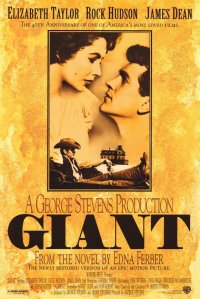
Legacy. When you think about it, how much power does that word really have over you? For some, it is nothing. For others, it is everything.
What we leave behind in this world, how we have impacted the people around us and how the world will remember us. It can shape a man's life, trying to provide for his family and making sure they grow up to be respectable people. But once that man is long gone and many generations have passed, will his legacy mean anything? Is that man, who focused so much on making sure the world remembers him, living in a future he will never see rather than the present?
Among many other things, that is the driving force behind George Stevens' 1956 film "Giant." This epic chronicles three generations of one family out of a massive cattle ranch in Texas, focusing mostly on Bick Benedict (Rock Hudson) and his newlywed, Leslie (Elizabeth Taylor), a socialite from Maryland and must become accustom to this strange new life in the heart of desert cow country. All the while, Bick and Leslie face many perils, including themselves and egotistical farm-hand Jett Rink (James Dean), who constantly quarrels with Bick.
In a way, the story can't be any simpler. We watch as Bick and Leslie fight, their own lifestyles and personal choices getting in the way, raise their kids, decide what is right for themselves and their children and the consequences of those actions. The conflict is not forced in any way, as the drama and resulting action comes naturally from the characters.
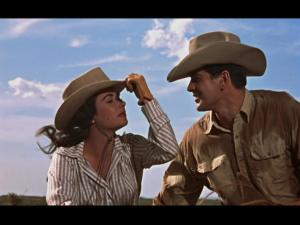
The main flaw within many of these characters is too much pride. Bick has so much pride in the legacy of the Benedict family line that he must keep it going, and his son must keep it going after him. But he never takes into account that his son may not want to be a rancher. He believes in the strength of his family and does what is right for that. Nothing else matters. This leads to Bick's life falling apart when his son wants to be a doctor and the need for cattle begins to decrease in America.
Bick never took into account that, as he got older, the world would change.
Leslie can be full of herself, but is quick to adapt. When she arrives in Texas, she is put off by waking up early in the morning to find her husband has been up for hours, that her breakfast has been made by Bick's overprotective sister Luz, and faints due to the hot Texan air. Luckily, the next day she gets up before everyone else, makes breakfast for Luz and wants to go horseback riding with Bick.
Her need to assert herself gets in the way many times, all to prove that she, and women in general, should be treated as equals to men. She has an outburst in front of Bick and his friends during their conversation on "men stuff" and how they're setting the world back 100,000 years. Leslie is a proud woman, married to a man who sees men and women as two different species. Which is why they're perfect for each other.
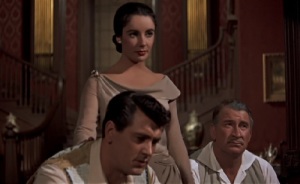
Bick gives Leslie strength, and Leslie gives Bick purpose.
There's nothing necessarily wrong with what Bick or Leslie do over the course of the film. Both of their actions speak of two different life philosophies, different end-goals and they are products of their times. Bick is very much an "old ways" kind-of-guy; Men are the strong ones who bring in the money, and women are supposed to raise the kids, cook, clean and make her husband happy. Leslie grew up around politics and social gatherings, where she was allowed to study all sorts of topics and speak her mind.
This leads to their children being mixed up people once they grow up. Even they admit it when discussing where their twins are heading in life. "We've raised an odd set of fledglings," says Leslie.
However, no matter what choices their kids make, they're willing to make the sacrifice of their legacies for the happiness of their offspring. Their pride still rears its ugly head sometimes, like during Christmas morning and Bick gets drunk on bourbon, but only because they have been hurt by their sacrifice.
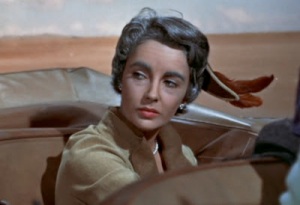
"We can raise our children, but we can't live their lives for them," says Leslie. To me, this is the line that encapsulates the struggle of Bick and Leslie, and "Giant" as a whole.
It speaks of struggles that we must all face. Personal sacrifice and the willingness to help out the ones we love. That we would do anything, even give up our dreams, if it means our children can live a better life.
Bick may not have given his children the lives that he wanted for them, but he has given them lives they wanted to see through to the end. That is what a legacy truly stands for.
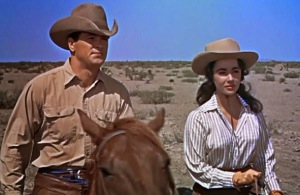
"Giant" is a masterpiece. At over three and a half hours, it moves a fast pace and never feels like it is dragging. Each scene has importance and is beautifully shot, making the Texan landscape feel enormous yet empty. Every character is fully fleshed out and feels just as relatable today as they did in 1956. The way "Giant" moves feels natural, never doing something just to grab the audiences' attention, only to show the hardships, pride, love and legacy of Bick and Leslie Benedict.
Final Grade: A+

No comments:
Post a Comment